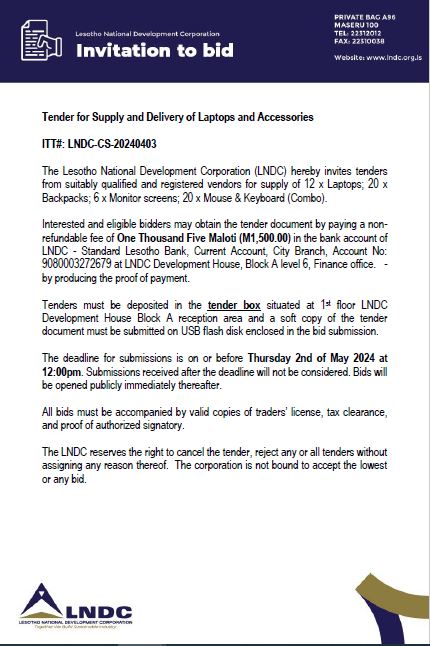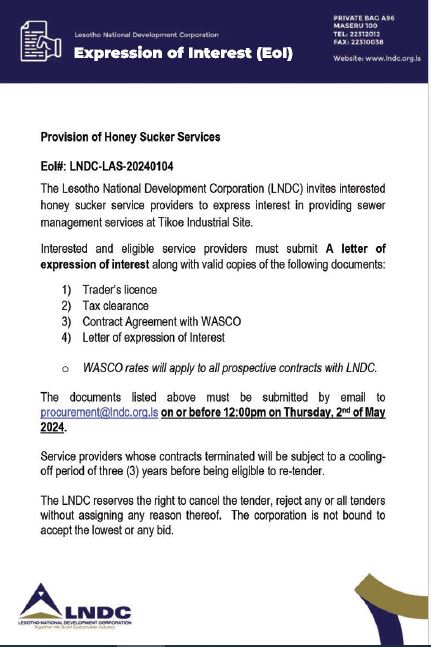… Town Clerk says taps won’t have water until bill is settled
MojabengMoalosi
For every M2.00 collected from the Qacha’s Nek market centre, street vendors operating food stalls have a sigh of relief for the sustainability of their businesses.
As unhygienic as it may be perceived, the vendors have been collecting water from the centre’s public toilets for cooking.
This has been a reality for the past five years.
The vendors revealed that despite countless attempts to have the market centre taps fixed, their plight has not been responded to, leaving them with no choice but to simply draw water from the toilet to cook.
“The M2.00 charge for each toilet use helps to sustain access to water for the public toilets and for us, it means access to water for cooking,†Qacha’sNek Street Vendors Association Chairperson, Matseko Maluma said.
The vendors’ inability to access clean running water goes against food handling standards, this is according to the Socio Economic and Hygienic Aspects of Street Food Vending Lesotho report.
The report points out that hygiene is paramount in dealing with food, citing the catering industry needs to be carried out under high hygienic standards.
“… This comes in handy in ensuring that customers are given reliable and safe food,†the report says.
It added, “The food industry is one sector crucial to society because it offers a product deemed necessary to humans, and for sustainability, the industry should be keen to ensure the safety of the food they are giving to people is observed.â€
According to the report, street food vending is a growing phenomenon in many countries and contributes to the livelihoods of many people, although the sector is faced with hygiene as an umbrella challenge.
“Safety of food is often compromised because the vendors operate on unhygienic environment which leads to contamination.â€
The report points out that in Lesotho, 75% of food vendors are women.
Maluma’s description of their working environment confirms the findings of the report which also revealed that at least 51% of vendors report to make M100 profit per day from the growing sector.
“We have complained to the town clerk and have also gone to the Qacha’s Nek council offices seeking help, but all our efforts were in vain. We were told that there is a water bill debt that needs to be paid, a problem we don’t know of, nor do we even understand it’s relevance to out problem. We don’t know why that bill has not been settled all this time,†the chairperson lashed saying the 700 street vendors operating at the market centre pay rent for their stalls.
“There are more than 700 vendors operating different businesses at the marketcentre, all who pay rent for their stalls. We also pay two maloti every time we use the public toilets. There are funds collected by the town clerk, so we don’t know why they don’t pay the water bill,†Maluma said.
The SocioEconomic and Hygienic Aspects of Street FoodVendors Lesotho report indicated that the main source of water for the vendors (74%) was the public taps while only 2 % of the vendors had taps in their shops.
“Majority of the street food vendors (99%) washed their hands in one container, with only 1 washing under running water. For those reported to have had employees, 57% reported that employees washed hands in the same container used for washing dishes and 12 % poured from a jug.
“Majority of the vendors (97%) use public toilets whereas 3% indicated the use of the private toilets.
The report states that a large percentage of customers of street food vendors were travellers and shoppers, 50% of both men and women and taxi drivers 30% .
“They consume the meals on site or as take-away depending on individual choice.â€
“Some of the vendors also reported that school children 2.6% and office workers 10.4% were some of their customer.”
The hygienic horrors of the Qacha’s Nek market centre resurfaced during a meeting between vendors and Small Business Minister Keketso Sello a fortnight ago.
In rage and dismay, Minister Sello instructed Qacha’s Nek District Administrator (DA) ‘Muso Jane to give an explanation why people use toilet water for cooking.
“I don’t believe this! I don’t tolerate this at all, there has to be an explanation for this,†the minister charged, demanding answers, but the DA was quick to shift the blame to the office of the Town Clerk, saying it was responsible for the well-being of street vendors.
“The town clerk is better suited to giving a better explanation of this issue,†the DA said.
Town Clerk, first Mpho Lesia confirmed that the vendors relied on toilet water for cooking.
Lesia further confirmed that the reason behind public taps running dry was a high water bill which has not been settled.
“Street food vendors fetch water from the tap that is located inside the toilets in market centre. The tap that was outside the toilet was closed after the water bill was not paid,†the Town Clerk said, adding, “People who use public toilet pay M2.00 per person but the money collected goes into the consolidate accounts at sub accountant. We don’t have power over such money.” Lesia explained.
Left in awe of what he has just learned, Minister Sello immediately called Local Government Principal Secretary, Nonkululeko Zally
The Principal Secretary was asked if she knew that people have been fetching water from market centre’ public toilet tap to cook, but she was quick to show no knowledge of such. Zally was directed to help sort the mess.
“Food is something that needs to be at standard level and hygiene is the first thing to consider, Food taste and customer care. I promise to work on this issue as soon as possible,†he assured the vendors.






